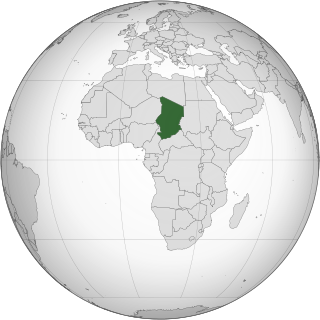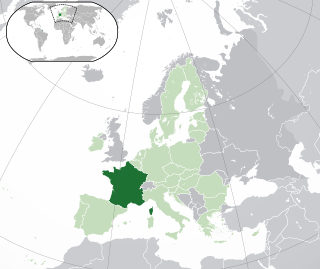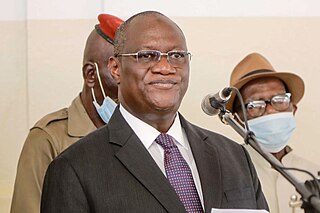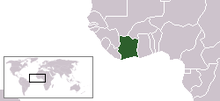
Dyula is a language of the Mande language family spoken mainly in Burkina Faso, Ivory Coast and Mali, and also in some other countries, including Ghana, Guinea and Guinea-Bissau. It is one of the Manding languages and is most closely related to Bambara, being mutually intelligible with Bambara as well as Malinke. It is a trade language in West Africa and is spoken by millions of people, either as a first or second language. Similar to the other Mande languages, it uses tones. It may be written in the Latin, Arabic or N'Ko scripts.

Lesbian, gay, bisexual, and transgender (LGBT) people in Chad face legal challenges not experienced by non-LGBTQ residents. Both male and female forms of same-sex sexual activity are illegal in the country. Before the new penal code took effect in August 2017, homosexual activity between adults had never been criminalised. There is no legal protection against discrimination based on sexual orientation and gender identity.

Lesbian, gay, bisexual, and transgender (LGBT) people in Mali face legal and societal challenges not experienced by non-LGBTQ residents. Although same-sex sexual activity is not illegal in Mali, LGBT people face widespread discrimination among the broader population. According to the 2007 Pew Global Attitudes Project, 98 percent of Malian adults believed that homosexuality is considered something society should not accept, which was the highest rate of non-acceptance in the 45 countries surveyed. The Constitution of Mali has outlawed same-sex marriage since 2023.

Bernard Binlin Dadié was an Ivorian novelist, playwright, poet, and administrator. Among many other senior positions, starting in 1957, he held the post of Minister of Culture in the government of Côte d'Ivoire from 1977 to 1986.
The lois scélérates – a pejorative name – were a set of three French laws passed from 1893 to 1894 under the Third Republic (1870–1940) that restricted the 1881 freedom of the press laws, after several bombings and assassination attempts carried out by anarchist proponents of "propaganda of the deed".

Lesbian, gay, bisexual, and transgender (LGBT) rights in France are some of the most progressive by world standards. Although same-sex sexual activity was a capital crime that often resulted in the death penalty during the Ancien Régime, all sodomy laws were repealed in 1791 during the French Revolution. However, a lesser-known indecent exposure law that often targeted LGBT people was introduced in 1960, before being repealed in 1980.

Lesbian, gay, bisexual, and transgender (LGBT) people in Luxembourg have the same legal rights as non-LGBT people. Partnerships, which grant many of the benefits of marriage, have been recognised since 2004. In June 2014, the Luxembourgish Parliament passed a law enabling same-sex marriage and adoption rights, which took effect on 1 January 2015. Additionally, discrimination on the basis of sexual orientation and "change of sex" in employment, healthcare and the provision of goods and services is outlawed, and transgender people are allowed to change their legal gender on the basis of self-determination.

Throughout the Cold War, Ivory Coast's foreign policy was generally favorable toward the West. In particular, Félix Houphouët-Boigny kept relations with France that was among the closest between any African country and a former colonial power. The country became a member of the United Nations at independence in 1960 and participates in most of its specialized agencies. It is also an associate member of the European Union. In general, President Bédié initiated and maintained relations with many countries of the European Union and Asia. Ivory Coast maintains a wide variety of diplomatic contacts.

Lesbian, gay, bisexual, and transgender (LGBT) people in Burundi face legal challenges not experienced by non-LGBTQ citizens. While never criminalized before 2009, Burundi has since criminalized same-sex sexual activity by both men and women with a penalty up to two years in prison and a fine. LGBT persons are regularly prosecuted and persecuted by the government and additionally face stigmatisation among the broader population.

Lesbian, gay, bisexual, and transgender (LGBT) people in Mauritania face severe challenges not experienced by non-LGBTQ residents. Both male and female kinds of same-sex sexual activity are illegal in Mauritania. Openly homosexual Muslim men face stoning to death, though there have been no known cases of executions caused by homosexuality charges in the country; whereas women who have sex with women face prison.

Lesbian, gay, bisexual, and transgender (LGBT) people in Senegal experience legal persecution. Senegal specifically outlaws same-sex sexual acts and, in the past, has prosecuted men accused of homosexuality. Members of the LGBT community face routine discrimination in Senegalese society.
Akoupé-Zeudji is a small village in southern Ivory Coast. It is located in the sub-prefecture of Anyama in the Autonomous District of Abidjan. Prior to 2011, it was in the Abidjan Department, Lagunes Region. It lies roughly 13 kilometres (8.1 mi) to the northwest of the city of Abidjan, just to the northeast of Attinguié.

Lesbian, gay, bisexual, and transgender (LGBT) people in Togo face legal challenges not experienced by non-LGBTQ residents. Both male and female forms of same-sex sexual activity are illegal in Togo, with no legal recognition for same-sex marriage or adoption rights.

The 2010–11 Ivorian crisis was a political crisis in Ivory Coast which began after Laurent Gbagbo, the President of Ivory Coast since 2000, was proclaimed the winner of the Ivorian election of 2010, the first election in the country in 10 years. The opposition candidate, Alassane Ouattara, and a number of countries, organisations and leaders worldwide claimed Ouattara had won the election. After months of attempted negotiation and sporadic violence, the crisis entered a decisive stage as Ouattara's forces began a military offensive in which they quickly gained control of most of the country and besieged key targets in Abidjan, the country's largest city. At the time, international organizations reported numerous human rights violations, and the UN undertook its own military action with the stated objective to protect itself and civilians.
Prostitution in Ivory Coast is legal, but associated activities, such as soliciting, pandering or running brothels, are illegal. Sex workers report law enforcement is sparse and corrupt. Police sometimes harass sex workers and demand bribes or sexual favours. Transgender prostitutes are often targeted by police and soldiers and subjected to violence. It was estimated in 2014 that there were 9,211 prostitutes in the country.

The Rally of Houphouëtists for Democracy and Peace is a political party in Ivory Coast.

Les Feuilles d'Automne is a collection of poems written by Victor Hugo, and published in 1831. It contains a multitude of poems, six of which are especially known as Soleils Couchants.

Crime in Cote d'Ivoire is prevalent and versatile across the West African country. The most common forms of crime include child labour, arms trafficking, terrorism and human rights abuse. Other less common, but still evident types of crime include cannabis and synthetic drug trade, sex trafficking, fauna and flora crimes, cybercrime.
Michel Gondi Gueu is an Ivorian politician and army general (2S).

Téné Birahima Ouattara is an Ivorian politician who is currently the Minister of Defense of Ivory Coast. He has previously served as the country's Minister of Presidential Affairs and head of the national intelligence department. He is the brother of Ivorian President Alassane Ouattara.
















